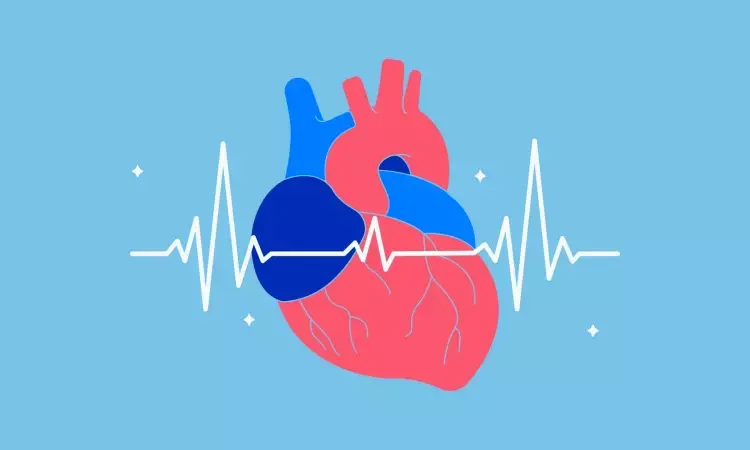- Home
- Medical news & Guidelines
- Anesthesiology
- Cardiology and CTVS
- Critical Care
- Dentistry
- Dermatology
- Diabetes and Endocrinology
- ENT
- Gastroenterology
- Medicine
- Nephrology
- Neurology
- Obstretics-Gynaecology
- Oncology
- Ophthalmology
- Orthopaedics
- Pediatrics-Neonatology
- Psychiatry
- Pulmonology
- Radiology
- Surgery
- Urology
- Laboratory Medicine
- Diet
- Nursing
- Paramedical
- Physiotherapy
- Health news
- Fact Check
- Bone Health Fact Check
- Brain Health Fact Check
- Cancer Related Fact Check
- Child Care Fact Check
- Dental and oral health fact check
- Diabetes and metabolic health fact check
- Diet and Nutrition Fact Check
- Eye and ENT Care Fact Check
- Fitness fact check
- Gut health fact check
- Heart health fact check
- Kidney health fact check
- Medical education fact check
- Men's health fact check
- Respiratory fact check
- Skin and hair care fact check
- Vaccine and Immunization fact check
- Women's health fact check
- AYUSH
- State News
- Andaman and Nicobar Islands
- Andhra Pradesh
- Arunachal Pradesh
- Assam
- Bihar
- Chandigarh
- Chattisgarh
- Dadra and Nagar Haveli
- Daman and Diu
- Delhi
- Goa
- Gujarat
- Haryana
- Himachal Pradesh
- Jammu & Kashmir
- Jharkhand
- Karnataka
- Kerala
- Ladakh
- Lakshadweep
- Madhya Pradesh
- Maharashtra
- Manipur
- Meghalaya
- Mizoram
- Nagaland
- Odisha
- Puducherry
- Punjab
- Rajasthan
- Sikkim
- Tamil Nadu
- Telangana
- Tripura
- Uttar Pradesh
- Uttrakhand
- West Bengal
- Medical Education
- Industry
Drinking moderately can help avoid 'holiday heart syndrome'

Holiday heart syndrome is heart rhythm problems caused by excessive alcohol consumption which is hallmark of holiday season especially during time for celebration.
December brings a notable bump in the number of patients who show up at hospital emergency rooms with what’s known unofficially as holiday heart syndrome -heart rhythm problems caused by excessive alcohol consumption, said Sharon Reimold, M.D., Professor and Vice Chair for Clinical Operations and Faculty Development in the Department of Internal Medicine at UT Southwestern Medical Center.
“It’s common for people to go to multiple parties during this time of year. You go to one party and have a drink or two, go to the next party and have a couple more. It’s the cumulative effect of alcohol that can put you at risk, sending your heart into atrial fibrillation,” noted Dr. Reimold, who is a cardiologist.
Atrial fibrillation, or AFib, is an irregular and rapid contraction of the upper chambers of the heart. The most common symptoms include shortness of breath, lightheadedness, chest pain, heart palpitations, and a feeling that the heart is beating much faster than normal. AFib is associated with an increased risk of stroke and heart failure.
Symptoms may be sporadic and usually clear up within 24 hours, but you should never ignore them. Always seek medical assistance whenever you experience heart problems, including holiday heart syndrome.
The condition doesn’t manifest only during the holidays. It can occur any time excess alcohol is involved. Too much food, particularly salty foods, can also be a contributing factor.
Federal health guidelines define moderate alcohol consumption as no more than two drinks a day for men and no more than one a day for women. A drink is defined as 8 ounces of beer, 5 ounces of wine, or 1.5 ounces of spirits. Those guidelines also recommend no more than 2,300 milligrams of sodium a day. The American Heart Association advocates limiting sodium to 1,500 milligrams a day.
Studies have found a significant proportion of new AFib cases are linked with drinking too much alcohol. And once an episode has been confirmed, patients have a greater chance of AFib recurring in the future.holiday heart syndrome
Dr. Reimold advises people in the holiday spirit to pay attention to how much they’re drinking and eating this season. Moderation is key, she said. Another option includes the growing market of nonalcoholic beers, alcohol-free wines, mocktails, and no-alcohol spirits, from tequila to whiskey to gin.
Dr Kamal Kant Kohli-MBBS, DTCD- a chest specialist with more than 30 years of practice and a flair for writing clinical articles, Dr Kamal Kant Kohli joined Medical Dialogues as a Chief Editor of Medical News. Besides writing articles, as an editor, he proofreads and verifies all the medical content published on Medical Dialogues including those coming from journals, studies,medical conferences,guidelines etc. Email: drkohli@medicaldialogues.in. Contact no. 011-43720751


